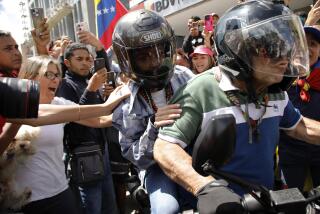Protesters again mass in Egypt’s Tahrir Square
- Share via
CAIRO — Tents and rage bloomed in Cairo’s Tahrir Square on Thursday as the Muslim Brotherhood and other political groups staged a sit-in over fears that Egypt’s military rulers were plotting to hijack presidential election results to give victory to an ally of deposed leader Hosni Mubarak.
The protest by thousands of Egyptians was a signal to the military council that Tahrir — the epicenter of the uprising that overthrew Mubarak early last year — is a symbol that could still rouse a nation angry over the army’s intensifying grip on authority and its betrayal of the revolution. Military officials are concerned about possible violence when the runoff election results are announced in coming days.
The Muslim Brotherhood and independent judges have projected that Brotherhood candidate Mohamed Morsi defeated Ahmed Shafik, a retired air force general who served as Mubarak’s last prime minister, by about 900,000 votes in the recent poll. The election commission, which is investigating claims of fraud on both sides, has delayed releasing the results, drawing criticism from the Brotherhood that the army is angling to deliver a victory for Shafik.
“The military stole our revolution and deceived us,” said Omar Abdel Fattah, a teacher who traveled more than 200 miles from the north Sinai to Tahrir, where drumbeats and chants echoed through the heat. “We won’t leave here until we get what we want: Mr. Morsi becomes president and the parliament is restored.”
The Supreme Council of the Armed Forces, or SCAF, has taken decisive steps over the last week to ensure it will shape the nation’s political future. An army declaration has severely limited presidential powers, martial law has been expanded, the generals are overseeing the drafting of a constitution, and Egypt’s highest court dissolved the Islamist-dominated parliament.
“I’m not a cow or a sheep. God gave me a brain. I don’t believe the army anymore,” said Omar Sultan, a national flag draped over his shoulders. “I used to dream I’d never see a free election in my life, only in paradise. But now we’ve had a free election and the army is giving us hell. These generals think like my grandfather.”
Security has been bolstered in the capital and other cities as both candidates are claiming victory. Shafik supporters have suggested that the Brotherhood, which renounced violence against the state decades ago, might turn militant if Morsi is denied the presidency. A pro-Shafik newspaper reported propaganda that the Islamist group is planning to arm young men and position “snipers and gunmen on top of buildings.”
The Brotherhood has rejected such assertions, saying it will win power through elections, court cases and international pressure on the army. The organization is wary that the military will revive a strategy used for decades by Mubarak: tainting Islamists as radicals out to destroy the state, at a pivotal time when many Egyptians are fed up with demonstrations and political turmoil.
“We reject violence and armed conflict as occurred in Yemen, Libya and Syria,” Khairat Shater, a leading Brotherhood official, told the French newspaper Le Figaro.
The military will “give us Morsi as president but they will keep the ultimate power,” Mohamed Emad, a doctor, said in the square Thursday. “They want to give you something while they take away other things.”
But the country is economically and politically slipping toward renewed crisis. The Egyptian pound is at its lowest point in more than seven years, tourism and foreign investments are drying up and sporadic gas shortages have angered motorists. Some secularists have put aside their reservations about Morsi and view him as less of a threat to political rights than Shafik. Others, however, accuse the Brotherhood of political opportunism and of having an overly Islamic agenda.
“I will never take the side of the Brotherhood. I know their approach and I don’t trust them,” said Ahmed Hassan, an activist. “With Shafik in power, we can resist him. I’ll stand up to him, but you can’t resist someone speaking in the name of religion.
He added: “The Brotherhood are now in talks with the SCAF. Once they cut a deal with the military, they will leave us in the square.”
Tahrir, again, has become the focus of rebellion. If the Brotherhood doesn’t rekindle unity among disparate political factions and amass huge crowds to occupy the square before the election results are announced, the military may see that as a sign that public anger — and a nation’s will — is not sharp enough to challenge its authority. But many Egyptians see few other choices than taking to the streets.
“I have no home of my own, no land, I’ve nothing to lose. I’m not worried about myself, but I am worried about our youth,” said Saad Mahmoud, who traveled 15 hours by train from southern Egypt to reach the square. He stood amid new tents going up, new banners being raised.
“They accuse the Brotherhood of buying our votes by handing out rice and sugar, but what did the military council ever give us? Tear gas, bullets and dead bodies.”
Abdellatif is a news assistant in The Times’ Cairo bureau.
More to Read
Sign up for Essential California
The most important California stories and recommendations in your inbox every morning.
You may occasionally receive promotional content from the Los Angeles Times.











